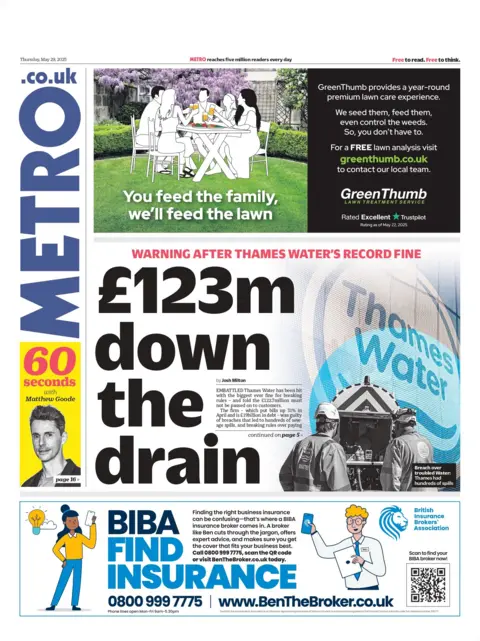In a recent newspaper headline, it was reported that approximately £123 million has been “down the drain” due to severe regulatory failures and operational mishaps at Thames Water, which has been recently described as “embattled.” The newspaper Metro highlighted this situation by pointing out that Thames Water received the largest fine ever imposed for breaching environmental regulations, alongside dealing with numerous sewage spills. This fine not only signifies a heavy financial burden for the company but also raises concerns about its operational accountability and the impact on the community.
This mounting financial pressure is a significant point of contention, particularly in light of the ongoing environmental crisis in the UK, where water companies are scrutinized for the management of waste and pollution. Public perception of Thames Water has steadily declined as consumers demand both transparency and accountability in the wake of these fines. Furthermore, the extensive coverage across various platforms emphasizes a growing public frustration with the inadequacy of management practices, thereby spotlighting a larger issue within the UK’s water supply sector.
Amidst this scandal, the Daily Star took a more sensational approach by featuring the headline, “Britain’s biggest sewer rats,” which presents a caricature of the company’s CEO, Chris Watson, riding a caricature of a giant rodent. The image evokes humor but underscores a much graver societal issue concerning the state of Thames Water’s operations and safety standards. The light-hearted portrayal juxtaposed with serious allegations reflects the complexities of public sentiment, combining outrage with a cynical humor as the affair unfolds.
The Financial Times seized on another angle, focusing on Christine Lagarde, president of the European Central Bank, who is reportedly considering stepping down from her role early to lead the World Economic Forum. This speculation was brought to light by Klaus Schwab, the founder of the Forum, suggesting the complexities surrounding leadership roles during times of economic uncertainty. Despite the distraction of Lagarde’s potential early resignation, many have pointed out that such drastic moves could create a destabilizing succession race within Europe’s top monetary authority.
In other news, reports indicate that the UK’s National Health Service (NHS) might face detrimental repercussions due to ongoing strikes by medical professionals. The Times recently pointed out comments made by Health Secretary Wes Streeting, who stated he would not yield to demands for a significant pay increase made by resident doctors, reflecting an ongoing tension between government policy and healthcare provision.
These current events highlight a critical intersection of political, environmental, and social issues shaping the UK. The media’s role in presenting these developments reveals the complexities surrounding the public’s understanding and engagement with large institutions like Thames Water and the NHS. Additionally, there are broader implications regarding how these organizations respond to public outrage and regulatory challenges.
The conversation extends to the potential repercussions for international travelers, as the Daily Express discusses the possibility of “Britons being barred from the US for censoring Americans online.” This narrative emphasizes the ongoing tension surrounding global free speech and regulation in the age of the internet. The Secretary of State Marco Rubio’s remarks underscore the clash between governance, technology, and personal freedoms, eliciting varied responses from the public.
In sum, the media coverage surrounding these issues illustrates the intricate interplay between environmental concerns, corporate accountability, and government policies. With organizations like Thames Water at the forefront of public scrutiny and healthcare workers striking for better pay, the implications stretch far beyond immediate financial losses, emphasizing a national dialogue about trust, governance, and the future of essential services in the UK.



